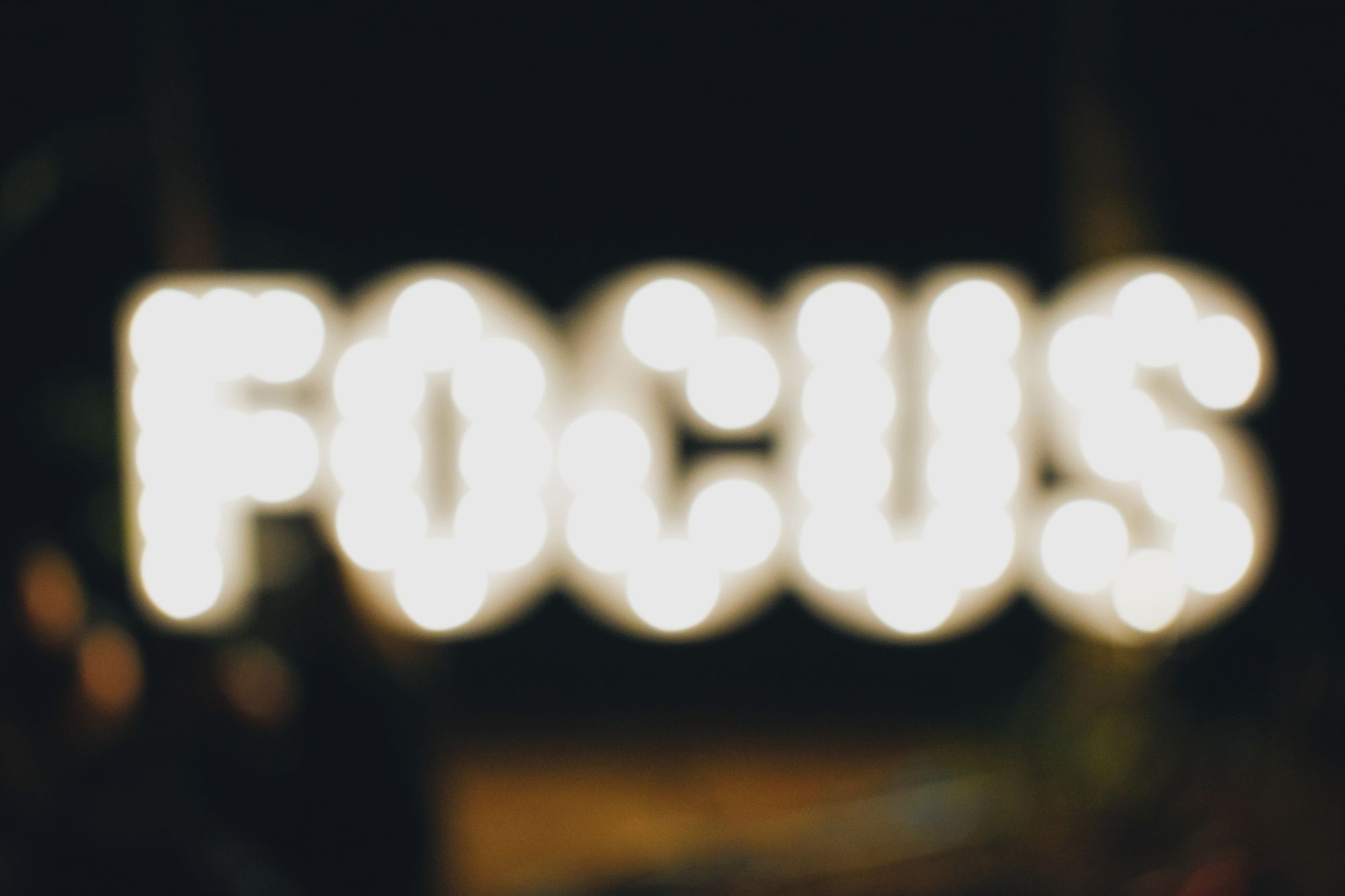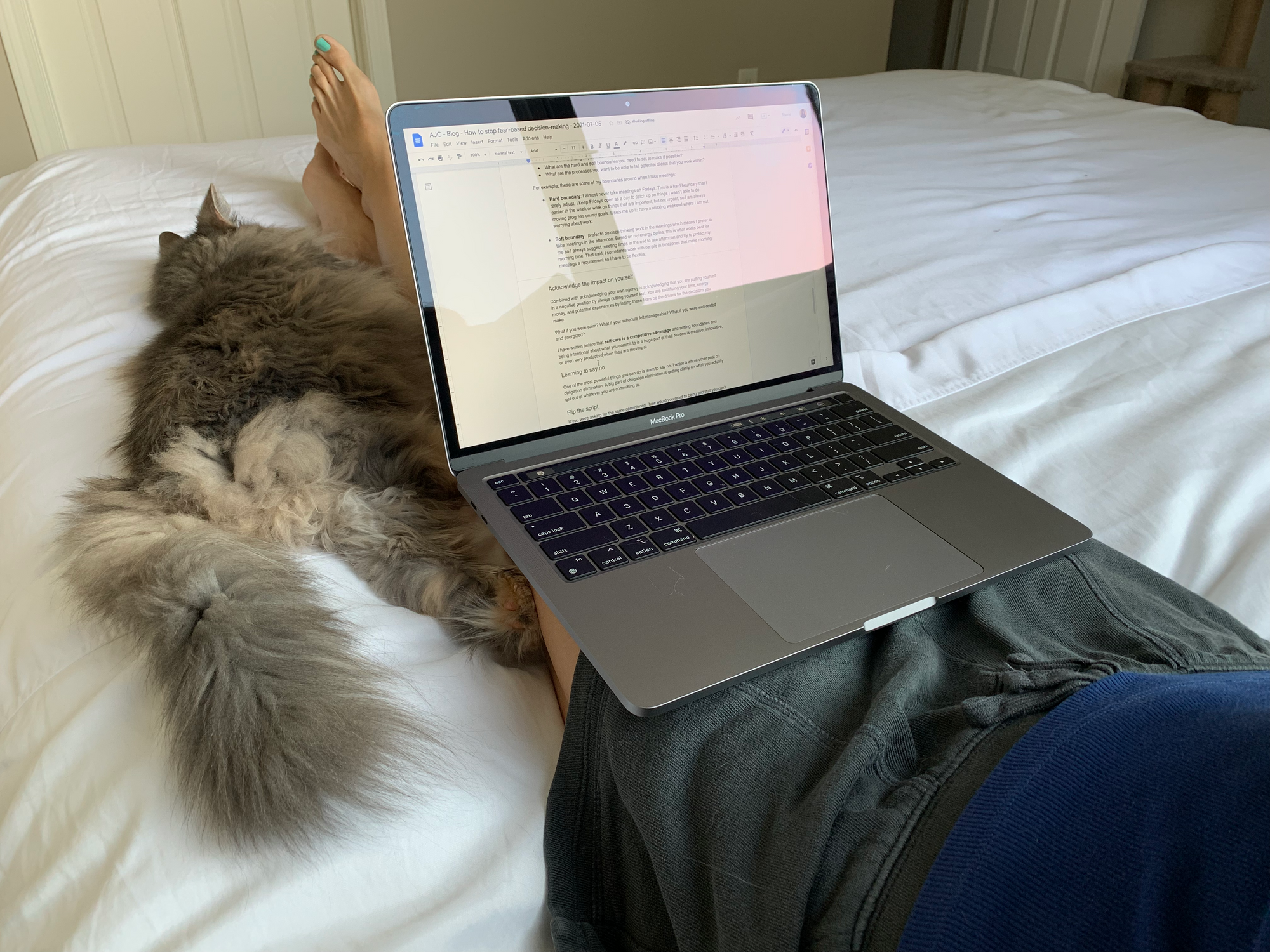How to Use Ritual to Support Deep Work and Stay Focussed
Learn how ritual supports deep work and focus and how to set up your own deep work ritual.

Uninterrupted, focused time on tasks that require deep thinking can be a tall order in our world of a million and one distractions. Between:
- Social media
- Colleagues or team members if you are in an office
- Family and pets if you are at home
- A myriad of chat apps
- Laundry
- Deliveries
- Meetings
- ...
...the number of times you get interrupted each day is astronomical.
It’s a wonder any of us get anything done at all!
One of the books I have read in the last year that helped support me in my quest for greater focus was Deep Work: Rules for Focused Success in a Distracted World by Cal Newport. There were many valuable learnings, but one in particular that has stuck with me is how powerful setting a deep work ritual is.
What does deep work mean?
Cal defines deep work as:
“the ability to focus without distraction on a cognitively demanding task”.
What you consider cognitively demanding will vary depending on your role and the type of work you do. Generally, it requires problem-solving or has some level of complexity that requires your full attention.
Cal further states that:
“the key to developing a deep work habit is to move beyond good intentions and add routines and rituals to your working life designed to minimize the amount of your limited willpower necessary to transition into and maintain a state of unbroken concentration.”
For me, deep work shows up in many facets of my work but most often as strategic thinking and writing. Writing (and being able to focus while doing it) is particularly important to me because it is a primary source of value I create for clients and is a marketing driver for my business.

Why does ritual support deep work?
Ritual, in this context, is “an act or series of acts regularly repeated in a set precise manner”. Ritual is a routine that you can do to calm your mind and body before you set out to focus.
The process of going through your deep work ritual sets the expectation both psychologically and physiologically for what comes next. Over time, you will be able to settle into focussed deep work faster and with greater ease. This is where the magic happens! It’s where you find that elusive flow state.
Conversely, it’s impossible to get to that deep work flow-state when your mind is full of your never-ending todo list, you are still annoyed about that email you got this morning, you know you have 15 unread Slack messages, your phone is vibrating every few minutes because your best friend wants needs to vent about their jerk co-worker, and you have a meeting in half an hour anyway. Whew! Whatever you are working on will take exponentially longer with all these distractions.
How to set up a deep work ritual
Everyone’s deep work ritual will look a little different and there is no right or wrong way to set one up. You want to think about the following 5 steps in the context of your role, schedule, work location, and the type of deep work you want to do.
1. Choose your environment
The environment you choose for your deep work session sets the stage. What this means will depend on how much control you have in your environment. You may have many options or you may only have your usual workspace. For many people, it is helpful for the space to be tidy since physical clutter can be distracting. What’s most important is that your environment is quiet and somewhere you can be undisturbed for a set amount of time.
You can compare choosing your environment to how some people force themselves to go to a gym to exercise, or hire a personal trainer so there is an obligation, or just hit the road for a run. These are all the environments for exercise and you should think about your environment for deep work in a similar way. What environment is most likely to set you up for deep work?
If you can, consider is having a location for your deep work that is different from your usual workspace. Having a separate deep work space helps your mind associate that space with the practice which can help you settle into your deep work faster and with greater ease. It supports the other parts of your deep work ritual but is not required.
2. Choose a block of time
Decide how long you are going to spend in your deep work. If you leave your deep work open-ended it will become a slog that loses value, because there is no end in sight and you have limited attention and willpower resources. Additionally, depending on your role and work location, you have to be practical about how long you can commit to deep work.
Beyond choosing the duration of your deep work you should think about when you are best equipped to be focused. Think about a time that fits in with your ability to control your environment and with your energy cycles. Think about the parts of your day when you feel most fresh and energized. It is much easier to focus and get in the zone when you are not fighting the post-lunch coma!
3. Choose the items that will support you
Items that support deep work are the physical objects that, in addition to your environment, set your deep work session up for success. These items help you focus, relax, and get in the zone. Examples could include::
- A beverage that you associate with getting to work (like, coffee or tea, or a tall glass of lemon water)
- Wearing comfortable clothes.
- Having a blanket or a fan at the ready so you are not too cold or too warm (depending on the season and where you live).
- Having headphones that you like for either music, if that helps you concentrate, or noise-cancelling, if you need even more quiet.
- A timer, which could be on your desktop, or it could be a physical one like your watch or a kitchen timer.

4. Remove all distractions
You can’t get into deep work if you are being interrupted every few minutes and your willpower is being tested via notification badges and phone vibrations. You need to:
- Turn off
- Mute
- Put away
- Close
- Hide
ALL THE THINGS. Close your door if you can. Make the distraction removal part of your ritual before deep work!
5. Make it a habit
Perform deep work every day (or every workday). Consistency is what will make the practice effective and drive results. The ritual becomes programmed into your mind and body. In the same way a bedtime ritual prepares your mind and body for sleep, your deep work ritual prepares your mind and body for focussed work.
Deep work is like working a muscle. The more you do it, the easier it becomes. You will notice over time that you get into the deep work mindset faster and can maintain it longer. You are able to focus and work through the problems, tasks, processes, projects, or whatever you are working on, with more creativity. And you will make noticeable progress, which is a great motivator!
Example: My Deep Work Ritual
1. Environment: My bedroom.
I work from home and share an office with my husband. We have shared an office for many years and it is no problem. I wouldn’t have it any other way! However, I decided to make my bedroom, sitting on my bed, my dedicated writing environment.
One reason is that before I started writing and coaching full time and I was doing much of this work on the side, I almost exclusively wrote my blog posts in the evenings in bed. I already associate writing with that space. I also prefer to be alone while I write. It’s comfortable, quiet, and gives my cat’s a place to lounge with me.
2. Block of time: 8:45 am to 9:45 am, Monday to Friday
My writing block is the first thing I do when I start my day. Mornings are when my brain is most fresh and I produce my best work. Afternoon writing is generally folly for me. As I mentioned, I also like to write in the evenings when I get my second wind, but it’s about 50/50 whether it will be good concentration-time.
Having my time block for writing first thing also ensures that it happens! Whatever else comes up in my day doesn’t interfere and it reduces the inevitable mental clutter that builds as the day progresses.
3. Support items: Coffee, water, headphones, watch, Penny
I start my writing sessions with a fresh cup of coffee and a glass of water. I have noise-cancelling headphones that I put on but without music. I also set my Apple watch timer for 1 hour and try not to look at it again until I feel those little haptic pulses on my wrist telling me my time is up.
My cat, Penny, has also learned this routine and is very pleased she gets to join me for dedicated Penny writing time.

4. Remove distractions: Close everything
The first thing I do when I open whatever article I am about to work on is close my email, Slack, WhatsApp, and Messages apps. I turn my phone on Do Not Disturb and turn it face down so I can’t see any incoming messages. Then I full screen my Google Docs browser window and get started. Some days that means I stare at a blank page for what feels like a lifetime before the words trickle out.
5. Habit: I write every weekday and created a streak
It is never a matter of if I will write, but rather when (assuming I have no other meetings) and what. If I want to produce weekly articles and continually improve, then I have to work at it consistently!
This ritual makes a big difference in letting me sink quickly into the deep work I require for my writing practice. Not every writing session is awesome and I don’t get into a flow state every time. But I make progress every single day as I build up a backlog of articles to share.
What is your deep work ritual?
Think about what you can do to establish a deep work ritual that works for you. Your deep work will be different from mine. Maybe an hour isn’t possible but you can make half an hour work. Maybe you find late afternoon is your best time block. Maybe your current workspace is ideal and you don’t need a different one.
You might also try a few different variations until you get the right space, at the right time, with the right support items. The specifics are up to you. Try a few things and see what works. And keep at it!
Once you give it a try, or if you already have one, I would love to hear about it. What are the steps you do for your deep work ritual?
- What is your deep work environment?
- What is your deep work block of time?
- What are your deep work support items?
- What are your deep work distractions?
- What is your deep work habit?
Share
Ashley Janssen

Productivity consultant, writer, speaker, serial entrepreneur, chaos calmer, introvert, cat-lady. Lover of books, fitness, old fashioned’s, basketball, and video games.
Follow me on
Twitter
or
LinkedIn.
Hire me for
1 on 1 productivity consulting
or
speaking.
Related articles

My 3 Favourite Productivity Newsletters

When You Do Things Matters


Comments ()